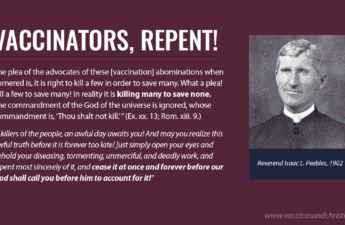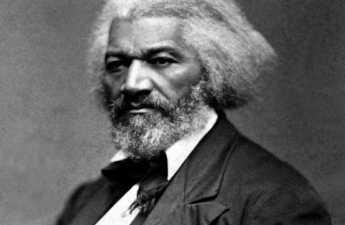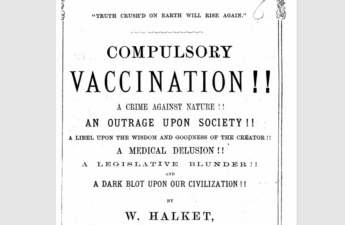
Capadose as Defender of the Faith
One of the most important – if not the most important – influences in Dutch Reformed history against vaccination was the doctor and Calvinist writer, Abraham Capadose (1795-1874), a Jewish convert to Christianity who lived in the Netherlands and took part in the Dutch Revival. Part of the Dutch Reformed Church, he strongly defended Calvinist orthodoxy against all opposition.[1] (At one point he would join the Presbyterian Free Church of Scotland.)
Capadoce was a ‘celebrity’ because of his family background, his circle of friends, his medical achievements, and the much-circulated account of his conversion. He was also an excellent speaker, and his story was translated in many languages and widely circulated. It hit the spot of contemporary concerns, challenging scepticism and secularism, bolstering the claims of Christianity by providing a forthright support for faith in Jesus on the basis of an appeal to the Hebrew scriptures and Capadoce’s yichus (his distinguished family background) and lived Jewish experience.[2]
A disciple of Willem Bilderdijk (1756-1832), whom we previously discussed, along with Guillaume Groen van Prinsterer (1801-1876) and a fellow Portuguese Jewish convert Isaac Da Costa (1798-1860), Capadoce and his fellow disciples “defended the Bible and the Reformed creeds and brought the spiritual awakening at Geneva to the Netherlands.”[3]
These students of Bilderdijk, along with another student, Willem de Clercq, “became known as the ‘Haagse Heeren,’ because they later assumed leading positions in the government.”[4]
Against the Evils of Vaccination
Following his conversion to Christianity, Capadose would come to oppose vaccination. The “Spirit of the Age” entailed a prideful trust in vaccination.[5] Capadose held that medical science
“has forgotten God and has adopted the principle that it should test all means … without first testing them against the principles of Religion.”[6]
(This spirit remains to this day, as the question as to whether vaccination is moral is still not the first consideration.)
And so, Capadose waged a campaign against smallpox vaccination (publishing objections in 1823) which would influence Holland’s Protestants.[7]
One argument was that vaccines were an attempt to thwart Divine Providence, as God grants both health and disease. However, he also argued that it was unlawful to give disease to one who is healthy, and pointed out the severe side-effects caused by smallpox vaccination.[8]
On Capadose, Ruijs writes,
Capadose stressed that vaccination as a preventive measure is not allowed as it is not known to humans if God intends to send disease, that vaccine – moreover – may cause disease in healthy children and that the aims of lifelong protection and eradication of disease are signs of misplaced human pride.[9]
Referring to Luke 5:31, Capadose would write that “Those who are well have no need of a physician, but those who are sick.” Thus, making someone who is healthy ill by vaccination is unbiblical.[10]
A Criminal Heathen Practice, Blasphemy, and Molech Worship

Capadose saw a link between vaccination and animal magnetism; moreover, he believed that to vaccinate a child is to engage in a heathen medical practice deserving of criminal punishment.[11]
For Capadose, then, those who vaccinate their offspring “sacrificed their children to Molech.”[12]
Capadose saw vaccination as a blasphemous attempt against God’s ways[13] – the natural result of a cursed period in history:
That period was branded with the seal of the curse by everyone who loved God and truth, a period that the Almighty seems to have destined to allow fallen man, driven by the spirit of darkness, a temporary but bitter victory over the true light, a period … prepared by a despicable Voltaire and his puny adherents.[14]
Legacy
Thanks to Capadose’s writings, many Protestants refused vaccination.[15] In 1881, The Vaccination Inquirer and Health Review said this of Dr. Capadose’s work:
Dr. Fabius, Professor of Jurisprudence, Amsterdam, denounced the cruelty of inflicting diseases upon healthy organisms by the State, and referred to Dr. Capadose’s able work against vaccination, written fifty years ago, when he stood alone against the pernicious medical nostrum.[16]
Takeaway
Dr. Capadose was a model opponent of vaccination in Christian history. He was salt and light, willing to stand firmly against both the evil of spiritual declension, as well as the evil of vaccines, which continues to commit global genocide on humanity — especially infants — to this day. Capadose called vaccines for what they are: evil, criminal, pagan, dangerous, and prideful.
Until the church takes vaccines more seriously, we may never see a significant decline in the evils caused by vaccines. May God raise up Christians who are willing to be salt and light like Dr. Capadose and take a stand.
Note: Dr. Capadose’s 1823 critique of vaccines is available here
While it is not written in English, in the Full Text option (here), one can right click the page and click “translate to English.” The translation will not be perfect, but one may find it somewhat helpful for understanding his arguments.
Notes
____________________________________
[1] richardsh, “16 December 1874 Death of Dr Abraham Capadose, critic of vaccination” (December 16, 2015, On This Day in Messianic Jewish History). Retrieved February 13, 2019 from https://messianicjewishhistory.wordpress.com/2015/12/16/16-december-1874-death-of-dr-abraham-capadose-critic-of-vaccination-otdimjh/
[2] Ibid.
[3] Robert P. Swierenga and Elton J. Bruins, Brothers’ Quarrels in the Dutch Reformed Immigrant Churches in the Nineteenth Century: The Pillar Church Sesquicentennial Lectures, 1997 (A.C. Van Raalte Institute, Hope College). Retrieved February 14, 2019, from http://www.swierenga.com/BrothersQuarrelsBook.html
[4] Ibid., endnote 11.
[5] Gerrit J. TenZythoff, Sources of Secession: The Netherlands Hervormde Kerk on the Eve of the Dutch Immigration to the Midwest (Grand Rapids, MI: Wm. B. Eerdmans Publishing Co., 1987), 91.
[6] Cited in Ibid.
[7] richardsh, “16 December 1874 Death of Dr Abraham Capadose, critic of vaccination.”
[8] Ibid.
[9] Helma Ruijs, Acceptance of Vaccination among Orthodox Protestants in The Netherlands (W.L.M. Ruijs, 2012), 14. Retrieved February 13, 2019, from https://repository.ubn.ru.nl/bitstream/handle/2066/98582/98582.pdf?sequence=1
[10] TenZythoff, Sources of Secession, 91, 92.
[11] Jaap Grave, Rick Honings, Bettina Noak, eds., Illness and Literature in the Low Countries: From the Middle Ages until the 21st Century (Vandenhoeck & Ruprecht, 2015), 153.
[12] Gewin, In den Reveilkring, 99-107; cf. Kluit, De Clercq-Capadose, 41-42. Cited in TenZythoff, Sources of Secession, 93.
[13] TenZythoff, Sources of Secession, 92.
[14] A. Capadose, Bestrijding der Vaccine of de Vaccine aan de Beginselen der Godsdienst, der Rede, en der ware Geneeskunde getoests (Amsterdam: Sulpke, 1823), 131, 132. (Title translation: “Fight against Vaccination, or Vaccination Weighed Against the Principles of Religion, Reason, and True Medical Science”.) Cited in TenZythoff, Sources of Secession, 92.
[15] Geurt Henk Spruyt, “Politicians and Epidemics in the Bible Belt,” Utrecht Law Review, Volume 12, Issue 2 (June) 2016 (accessible at https://www.utrechtlawreview.org/articles/abstract/10.18352/ulr.349/), 115.
[16] “The International Congress” in The Vaccination Inquirer and Health Review, vol.II, no. 22, January, 1881. In The Vaccination Inquirer and Health Review, Volume the Second, April 1880 to March 1881 (London: Edward W. Allen, 1881), 145.
If you find this site helpful, please consider supporting our work.


